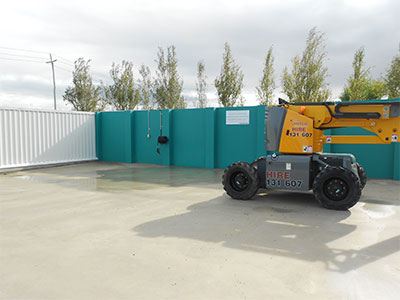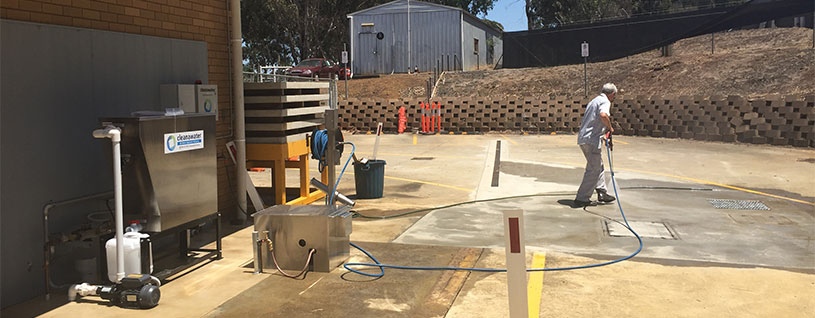Everything you need to know about unroofed wash bays and wastewater management
Unroofed wash bays provide businesses with an effective, environmentally-friendly and water authority compliant way to clean cars, trucks and heavy equipment.
What is classified as an unroofed wash bay?
 A wash bay is a cleaning station built for the purpose of cleaning vehicles and machinery. They can be made with a roof or without, in which case they are classified as an 'unroofed' wash bay.
A wash bay is a cleaning station built for the purpose of cleaning vehicles and machinery. They can be made with a roof or without, in which case they are classified as an 'unroofed' wash bay.
Generally, roofing is not required for a wash bay to be water authority compliant. However, this is not the case in all areas. If a wash bay exceeds 20m², in selected areas a roof may be required.
In most instances though, an unroofed wash bay will be sufficient for cleaning vehicles and for meeting water authority requirements.
When to install a wash bay
Does your business or industrial operation wash cars, trucks or heavy equipment? If you answered 'yes' to this question, then you must have a wash bay installed in order to meet water authority requirements.
Even if cleaning only takes place occasionally, a water authority compliant wash bay and wastewater treatment system is still required to ensure your business's compliance.
What is required for the treatment of unroofed wash bay wastewater?
All wash bays, whether roofed or unroofed, are required to include a pre-treatment device, which treats wash bay water prior to discharge. Not including this can lead to large fines or even closure of businesses.
Pre-treatment devices, including interceptor pits and oil separators are effective at removing hydrocarbons and suspended soilds from wash bay wastewater.
Because unroofed wash bays are not covered, they will also require equipment for handling rainwater. A diversion system is generally the best solution for diverting stormwater and for preventing flooding of sewerage.
To summarise, your unroofed wash bay will likely require:
- Oil separator
- Interceptor pit
- Diversion system
Installation of these three components is integral to meeting water authority requirements.

Why choose an unroofed wash bay?
The main advantage of an unroofed wash bay is price. Installing a roof on your wash bay can be costly. It can also be time-consuming as permits needs to be acquired before construction can take place. With an unroofed wash bay a roof is not required, therefore these issues can be avoided.
An unroofed wash bay is often a good option where height concerns are present. For example, if a business intends on cleaning large vehicles and equipment, such as cranes and the like, then an unroofed wash bay may be preferable to a similar roofed model.
"All wash bays, whether roofed or unroofed, are required to include a pre-treatment device."
When should an unroofed wash bay not be used?
Unroofed wash bays provide little protection from the elements. Therefore cleaning in extreme conditions can be difficult or uncomfortable for the cleaners involved.
If you require a wash bay capable of 'all weather' cleaning, including cleaning in 40 degree plus heat, rain or hail, then a roofed option may be more suitable as a roof provides protection from these things.
Roofed wash bays may also in some case negate the need for a first flush system, which could provide the customer with cost-savings.
Are permits required when installing a wash bay?
When installing a wash bay, it is important to contact your state or territory water authority in order to obtain a trade waste permit; you'll need this to connect to the sewer.
Should a sewer not be readily available, your local council or shire should be able to advise you on how to deal with wash bay wastewater according to the requirements of your region.
If you would like more information regarding unroofed wash bays or wastewater management systems, contact the team at Cleanawater on: 1800 353 788
Must Read
VapourGard: Your ultimate odour control solution
Control odours effectively and safely with CleanaWater's VapourGard system. Ideal for industries such as mining, landfill operations, recycling, and more, the VapourGard system uses lightweight partic ...
Read moreControl Odour with VapourGard
Control odours effectively and safely with CleanaWater's VapourGard system. Ideal for industries such as mining, landfill operations, recycling, and more, the VapourGard system uses lightweight partic ...
Read more